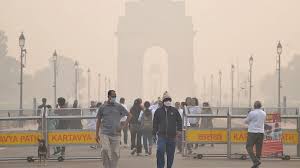
Delhi's Air Pollution: A Hidden Health Crisis
Delhi's air pollution has become a chronic issue, affecting public health throughout the year rather than just in winter. Dr. Vinit Banga, Director of Neurology at Fortis Hospital, Faridabad, emphasizes that this smog poses serious risks to various organs in the body, not just the respiratory system.
The Air Quality Index (AQI) in Delhi frequently exceeds hazardous levels, with particulate matter (PM2.5 and PM10) concentrations far above the World Health Organization's safety standards. These tiny pollutants don't remain in the lungs; they travel into the bloodstream and cause systemic inflammation, according to Dr. Banga.
Once in the blood, these particles lead to oxidative stress, resulting in hardened arteries, heart disease, and even stroke. Long-term exposure to PM2.5 has been linked to an increased risk of hypertension and cardiovascular-related deaths, as confirmed by studies published in reputable journals.
Even vital organs like the liver and kidneys suffer under the burden of constant exposure to these toxins. The body’s filters struggle to cope, trying to remove the harmful particles circulating in the bloodstream.
One of the most alarming aspects of air pollution is its impact on brain health. Dr. Banga notes that the fine particles entering the bloodstream can cross the blood-brain barrier, affecting cognitive function and increasing the risk of neurological diseases like depression and Alzheimer’s.
Children are particularly vulnerable. Continuous exposure from birth can hinder their lung development, brain growth, and immune systems, potentially leading to chronic illnesses before they even reach adulthood.
Unlike acute diseases that present obvious symptoms, pollution-related health issues accumulate slowly and silently over the years. Dr. Banga describes it as a "quiet assault," where the damage remains invisible until it manifests as severe health problems.
Despite the urgency of addressing air pollution, many people still underestimate its seriousness. The long-term internal damage caused by toxic air can go unnoticed for years, only to reveal itself as debilitating diseases.
While systemic policy changes are essential, immediate personal actions can serve as protective measures. Dr. Banga encourages individuals to take steps to shield themselves until the air quality improves. Although the smog might not seem like an emergency now, every breath taken in polluted air leaves an imprint on your health.











